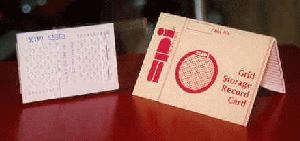SPI Supplies Fine 80 Nickel Grid Mesh 6 in (152 mm) Square Electrodeposited
6"x6"(15.25cm) square
Metal = Ni
Mesh = 80
Hole Size = 386 µm
Wire Width = 24.8 µm
Open Area = 85 %
These fine grid mesh materials are manufactured in three different metals: copper, nickel, and gold. Available in different mesh sizes, these fine mesh products do not have the accuracy needed, on a one square basis for making a meaningful calibration measurement. We would recommend that any measurements for calibration purposes should encompass a minimum of 20 consecutive squares. Fine grid mesh is also available in a high quality, high purity Nylon® mesh.
All of the SPI mesh products shipped as square pieces between two clean polymer film sheets, resulting in a convenient "sandwich" which can easily be cut with ordinary scissors into needed sizes for eventual use. Note that these two polymer film sheets are not permanently bonded to the mesh, and are easily removed so that the mesh by itself can be picked up and used as desired. A handy set of materials to have around any microscopy laboratory, be it light, electron, confocal or even scanning probe. We are of course able to produce mesh in other mesh sizes and other spatial sizes (up to 11" x 11"). If you have a requirement not being met by one of our standard products, let us know what you need. Anything "special" costs more money, but sometimes such costs can not be avoided.
Standard thickness:
For the SPI Supplies standard electroformed mesh, the thickness is between 0.0001" - .0002" (2.5 - 5.0 µm)
Other thicknesses are possible but only by incurring large set up costs.
High temperature applications:
When special requirements are present, for example, higher temperature screening is need, consider the use of the SPI Molybdenum Mesh.
Grid bar width vs. product fragility and quality:
Making these fine mesh grid products is a balance between the desire for greater open area and the need for the mesh to have enough mechanical strength to be handled. The wire mesh products that we offer are a compromise between these two, conflicting objectives. If we go to thinner bars, the probability of damaged and/or incomplete bars goes up considerably, so the products we do offer represent the best we can do on thin bars on a sustained basis. We share the desire of some of our customers for greater open areas in these products, but we're really not in a position to do it at a quality level that both we at SPI Supplies as well as our customers would find satisfactory
Information about handling:
The mesh can be cut with a precision scissors or even a single edge razor blade. And once cut, the mesh will lie flat and won't curl up into a "roll". One does have to exercise care to keep the mesh from wrinkling, since the folds tend to be permanent and won't come "out". But contrary to what some might think, these mesh materials do not curl up when cut into smaller pieces.
Specifications:
We do not offer these mesh products to be the best possible magnification calibration products, and though we realize some will end up being used just that way, we want to stress that we feel there are other more accurate and more appropriate products to be used for microscopy calibration purposes. But having said that, we would cite the following specifications to which we attempt to do the manufacturing of these mesh products:
Open area: ± 3%
Hole size: ± 2.5 µm
Bar width: ± 2.5 µm






